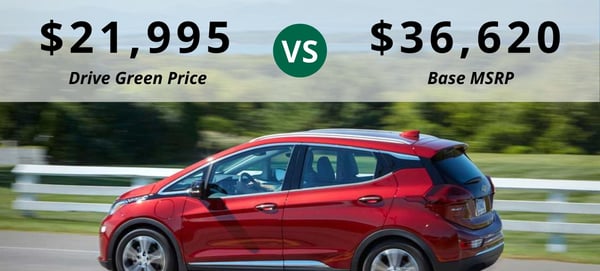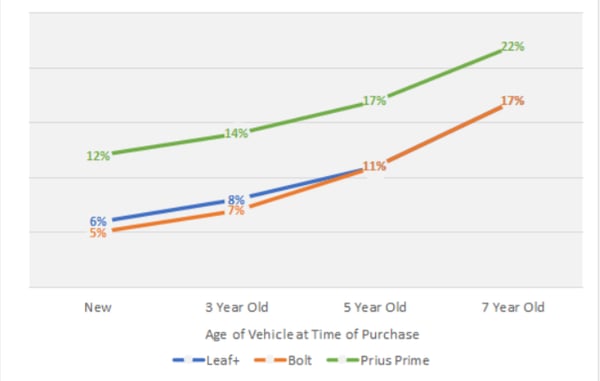.png?width=657&name=Electric%20Cars%20Are%20Cheaper...%20Really!%20(2).png) A new report by Consumer Reports has found that the average electric vehicle (EV) driver saves between $6,000 and $10,000 in lifetime costs compared to a gas-powered car. Their analysis considered a survey of 10,000 EV drivers and a review of depreciation, financing, sale prices, and fuel costs to reach a remarkable conclusion: EVs, like those that are available through our Drive Green program, win out compared to the best-selling, top-rated, and most-efficient cars in their class.
A new report by Consumer Reports has found that the average electric vehicle (EV) driver saves between $6,000 and $10,000 in lifetime costs compared to a gas-powered car. Their analysis considered a survey of 10,000 EV drivers and a review of depreciation, financing, sale prices, and fuel costs to reach a remarkable conclusion: EVs, like those that are available through our Drive Green program, win out compared to the best-selling, top-rated, and most-efficient cars in their class.
Early adopters of EVs often list “concern about climate change” as their primary motivation for going electric. We have been talking about how doing the right thing for the climate on EVs can be cost-effective for you, too — we are an alliance of consumers, after all. This Consumer Reports study confirms and expands upon the research we have drawn on before, as well as the experience of the EV drivers we work with.
Here are the five key takeaways from the report.
1. You will pay less than "MSRP" for many EVs.
The sticker price (“MSRP”) listed on an electric vehicle is often not what you will pay for it. The combination of federal incentives, state incentives, and other discounts make the purchase price substantially lower than the number you see advertised. For example, though the 2020 Chevy Bolt has an MSRP of $36,620, you can buy one for $21,995. The actual prices that consumers pay for EVs makes them much more affordable on an upfront cost basis than you might think. Plus most EVs are still eligible for a federal tax credit of up to $7,500 and, in Massachusetts, a state rebate of up to $2,500.

That's right - you can get a new Bolt much lower than the advertised price you often see. Explore the Chevrolet Bolt (and other EVs) here.
2.You will pay half as much in maintenance and repair with an EV.
As we have written before, electric cars do not have transmissions, oil to change, mufflers, fuel lines, or any of the other parts that give car-owners trouble at the mechanic. That translates to big savings. AAA previously reported lifetime savings from maintenance and repair as $3,500, but the new survey from Consumer Reports found that savings are closer to $4,600. That is better than we thought, and it is especially good news if you are a plug-in hybrid (PHEV) driver. Even with the gas engine and the occasional oil change, the electric powertrain in a PHEV keeps maintenance costs low.

The graph above shows lifetime savings from EVs compared to best-selling combustion engine vehicles in class; every EV beats its gas-guzzling counterpart. The Model 3 shows particularly good value when compared to other luxury sedans. Graph courtesy of Consumer Reports.
3. Fuel savings vary state to state, but you will save money no matter where you drive.
Nationwide, Consumer Reports finds fueling an EV to be 60% less expensive than buying gas. New England, with its low gas prices and high electricity prices, does not see the same caliber of savings. But EV drivers in Massachusetts and Rhode Island still save between $555 and $612 a year, which compares well with our own estimates.
Green Energy Consumers advocates for utilities to implement “time-of-use” charging rates to better manage the grid and bring down costs for everyone. This would also lower the cost of electricity for EV charging and improve the fuel savings of switching to an EV in the region.
It is also worth noting that annual fuel savings improve as vehicle sizes increase. SUVs and pickup trucks are the most expensive, most polluting, and most gas-intensive vehicles on the road because of their weight and size. While there are not yet many electric SUVs or pick-up trucks available on the market, buyers who are able to increasingly find electric options in these larger models will see even more savings than what CR found for smaller cars.
4. Second-and third-owners will get the biggest bang for their buck by going electric.
This is huge! “While new EVs offer significant cost savings over comparable ICE (Internal Combustion Engine) vehicles, the relative cost savings of an EV purchased when it is 5 to 7 years old can be two or three times as large,” according to Consumer Reports.
 As ICE cars age, their maintenance and repair costs grow much more rapidly than with an EV. So if you're comparing an older ICE to an older EV, you can expect the EV to be much more economical over the years. Because the cheapest cars on the market are often the least efficient, low-income folks tend to be overburdened with maintenance/repair costs, high fuel costs, and poor air quality. A robust market for pre-owned EVs would address all three issues.
As ICE cars age, their maintenance and repair costs grow much more rapidly than with an EV. So if you're comparing an older ICE to an older EV, you can expect the EV to be much more economical over the years. Because the cheapest cars on the market are often the least efficient, low-income folks tend to be overburdened with maintenance/repair costs, high fuel costs, and poor air quality. A robust market for pre-owned EVs would address all three issues. It could be a few years until the pre-owned market for EVs starts to thrive, but the sooner we can get new EVs on the road, the sooner the benefits can be realized by everyone. And of course, electrifying buses and trains can provide improved air quality without having to own a car at all.

Percent savings for EVs compared with best-selling ICE, by vehicle age at purchase; electric vehicles provide cost savings at every stage of ownership, but save the most when compared to older gas-powered cars. In other words, the long-term reliability of an electric car can’t be beat! Graph courtesy of Consumer Reports.
5. Electric cars are better cars for the money.
Finally, as a bonus — EVs far outperform combustion-engine vehicles in terms of acceleration, handling, and noise. The performance that comes standard in an electric car is typically something you pay a premium for when buying a gas-powered car. That means EV drivers get a better car for less money. This is why taking a test drive of an EV is important; unless you have gotten behind the wheel and experienced driving electric for yourself, the electric advantage is easy to overlook.
So, if you are still asking yourself, “Can I afford an EV?” The better question is, can you afford not to get an EV? Explore electric vehicles, old and new, with Drive Green.

.png?width=657&name=Electric%20Cars%20Are%20Cheaper...%20Really!%20(2).png)





Comments